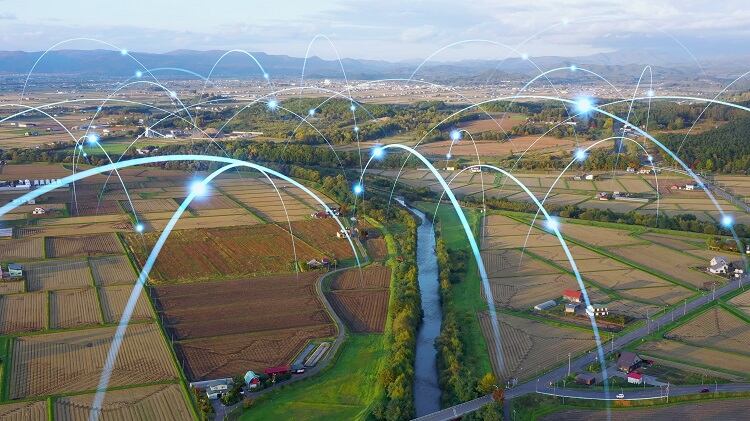The new report looks forward to 2045 to consider what the agri-food landscape may look like if agribusiness is to continue as usual.
Specific threats to farming and food security, encouraged by an accelerated breakdown of the environment, are underpinned by agribusiness’ increasing control of big data. Food security, argue the report authors, will consequently be ‘at the mercy’ of such digital networks.
Agribusiness-as-usual
The report, conducted by the International Panel of Experts of Sustainable Food Systems (IPES-Food) and the Action Group on Erosion, Technology and Concentration (ETC Group), predicts that ‘agribusiness-as-usual’ would result in technological advances taking the risk out of food systems.
By removing the risks, however, the authors argue that people would also be removed from the supply chain.
“With climate change, environmental breakdown, and pandemics wreaking havoc on food systems over the coming years, these ‘silver bullet’ solutions prove irresistible to panicking policymakers,” notes the crystal-ball gazing report.
“The keys of the food system are handed over to the biodigital megacorporations, data platforms, and private equity firms who – thanks to proliferating merger deals – become tomorrow’s agri-food giants.”
The result? Enhanced risk of food insecurity, as ‘powerful governments’ and ‘flag-bearer corporations’ use the internets of logistics to control resources and food supplies across ‘vast economic corridors’.
Food will ultimately be perceived as a ‘strategic asset’ between countries, prompting a ‘new wave’ of land, ocean and resource grabs, according to the forecasters.
‘It’s a control issue’
Such predictions reflect current environmental and health challenges. “Climate change, biodiversity loss, and rapidly declining soil fertility are critically damaging the health of people and the planet, dislocating societies, and threatening food systems around the world,” noted the report authors.
“Five years into a global commitment to eliminate hunger by 2040, we have lost significant ground.”
Therefore, lead author Pat Mooney believes it is time that fruitless agritech approaches to farming are put to bed.
“Because of the seriousness of the environmental predicament we find ourselves in – I refer not just to global warming but also widespread depletion of soils and biodiversity loss – it’s not a given to afford more time to food and farming approaches that don’t work,” he told FoodNavigator.
“When it comes to delivering food security for millions, including the most vulnerable, ‘Big Ag’ has simply not delivered. If it had, hunger would not continue to grow. Malnutrition and, perversely, obesity is also on the rise.”
Mooney, who co-founded ETC Group and sits on the board of IPES-Food, does believe next-gen technology has the potential to improve food and farming seasons, but told this publication it is a question of control.
“New data and information technologies definitely have the potential to help small providers and consumers. But of course, quite crucially, it depends on the ownership and control of these technologies. Is there a conflict of interest? Who gets to decide what? Who decides what you can farm? And therein lies the issue.
“To date, the experience with surveillance technologies, blockchains etc. is not encouraging. It is common sense to not gamble with swathes of smallholder farms and farmers when there are solutions that already work.”
‘Hyper-nudging on the rise’
Looking further down the food supply chain, to the consumer end, the report also warns of an uptick in ‘hyper-nudging’, whereby data from everyday transactions is ‘increasingly combined’ with information harvested online to ‘manipulate people’s eating habits in unprecedented ways’.
Connecting data sources – from online activities, digital wallets, automated food services, and other everyday activities – opens up new opportunities to track, micro-target, and ‘invisibly nudge’ people’s eating habits, and to ‘reshape food cultures’, noted the authors.
“Nudging is by no means new,” explained Mooney. “Super-nudging is different and nudging for the purpose of achieving broad societal goals (without conflicts of interest) can be very transparent,” he told this publication.
Looking at the ‘track record’, Mooney pointed to ‘super-influencers’ in the UK who are obliged to disclose when they are paid to promote companies or brands through social media, but ‘fail to do so roughly 40% of the time’. “It’s not encouraging.”
Another example lies in Cocoa-Cola, we were told. “Coca-Cola resists attempts to curb the presence of its sugary products near young people and their media spaces, but ‘nudges’ young customers to exercise.
“Society is entitled to wonder what is going on. Efforts such as these are concerning, because of the conflicts of interest. And that is the key distinction we have to draw.”
Ultimately, Mooney believes that the ‘keys of the food system’ are being handed over to data platforms, private equity firms, and e-commerce giants. “This is the dystopian future of food and the planet, unless civil society fights back.”
The Long Food Movement
The report also gazes to another potential future, one in which by 2045 civil society operates ‘as unusual’. In this scenario, ‘ecosystems refuse to be tamed’, ‘people refuse to be nudged’, and technologies malfunction.
The report authors describe a series of strategies for a ‘Long Food Movement’, designed to build sustainable food systems over the next 25 years.
Some of these strategies include diverting funds from major commodity subsidies to small-scale food producers, supporting short supply chains and territorial markets, levying taxes on junk food and CO₂, and adopting food security measures that supersede trade and individual property rules.
The environmental sustainability gains from such initiatives could be significant, noted the authors, who predict that civil society could force a shift of up to $4trn from the industrial food chain to food sovereignty and agroecology.
This includes $720bn in subsidies going to big commodity production, and as much as $1.6trn in healthcare savings from a ‘crackdown on junk food’, the report continued.
“The sum total of these action could cut 75% of food system emissions.”




